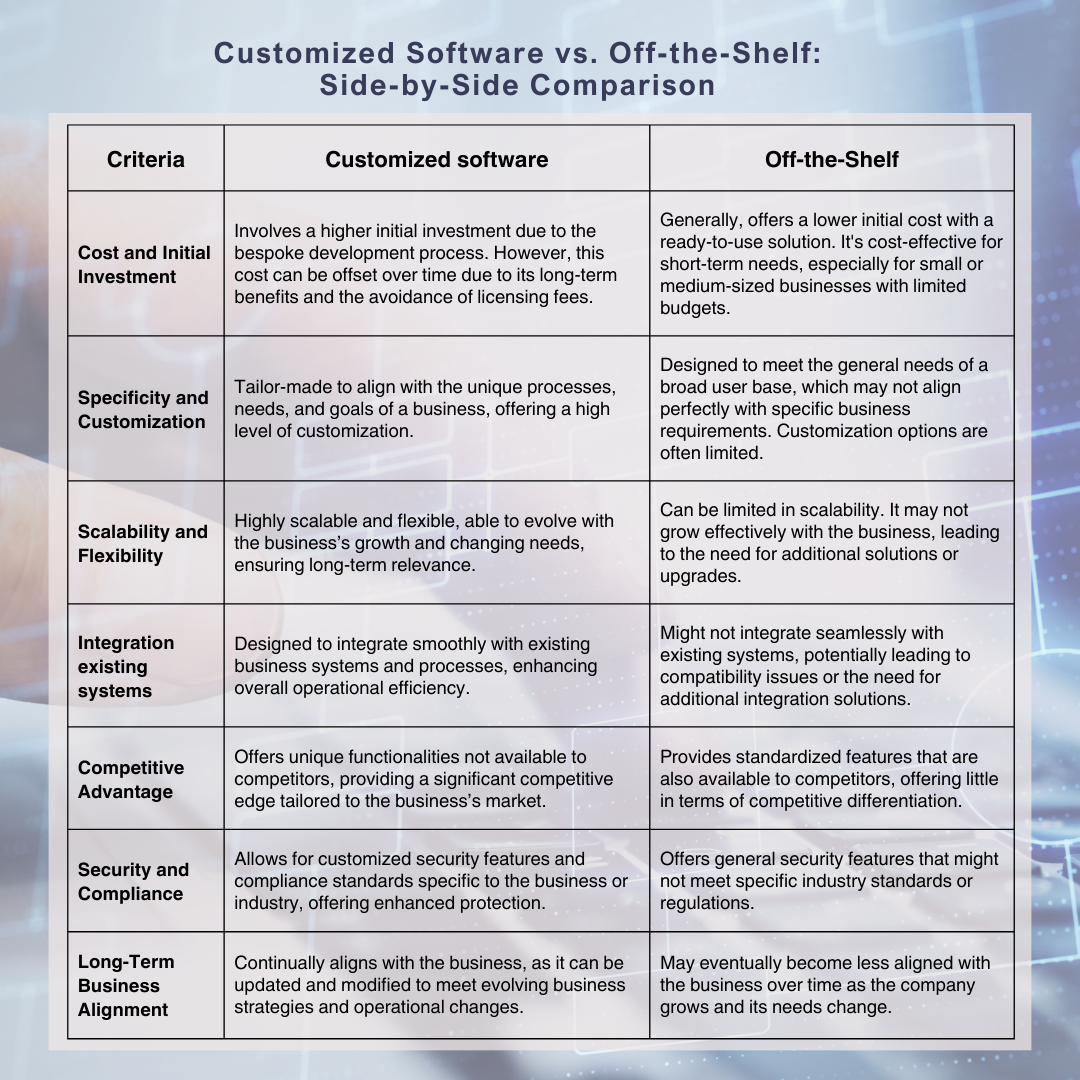Home
>
Benefits and Strategies of Custom Software Development for Businesses
5 minutes read
Audio description available
December 21, 2023
Personalized products and services are popular in many industries, and the same is true in the world of information technology. Customized software development is all about creating software that’s specially made for your business’s unique needs.
Choosing custom software can be more efficient and flexible, helping your business in the long term. Even though it might cost more at the start, investing in custom software is a good decision in the long run.
In this article, we’ll talk more about what custom software development is and how it can benefit your business.

What Is Customized Software Development?
At its core, customized software development is about creating software that is intricately designed to address the specific requirements of an individual business or user group. This personalization sets it apart from generic software solutions, offering a level of specificity and alignment with business goals that off-the-shelf software often cannot match. Custom software caters to the unique operational workflows, user experiences, and integration needs that are essential for businesses seeking a competitive edge in their respective industries.
To illustrate, consider the example of a popular custom software: Salesforce's Customer Relationship Management (CRM) system. While there are many CRM systems available, Salesforce stands out for its ability to be extensively customized. A business can tailor Salesforce to match its unique sales processes, customer engagement strategies, and data management needs. This allows businesses to operate more efficiently and gain a competitive advantage.Read also: Custom ERP Software Development: Tailored Solutions for Your Business
When Should Companies Build Customized Software?
Custom software development becomes a strategic decision when a business's unique requirements are not adequately met by generic software solutions. This path is particularly advantageous in situations where:
- The business necessitates specialized features that are not available in standard software packages.
- Scalability and adaptability are crucial for the business's evolving needs.
- Seamless integration with existing business ecosystems is imperative.
3 Customized Software Development Methodologies
Agile
Agile methodology, characterized by its flexibility and emphasis on iterative development, is ideal for projects where requirements are expected to evolve. It encourages collaboration and adapts well to changing needs.
Waterfall
This traditional model, known for its linear and sequential approach, suits projects with well-defined requirements and scopes. Each phase must be completed before the next begins, offering a structured framework.
Scrum
As a more focused approach within the Agile framework, Scrum is designed to deliver high-value features in a short time frame. It breaks the project into smaller, manageable segments, fostering team collaboration and rapid adjustments.
5 Advantages of Customized Software Development
Personalized Solution
Custom software is uniquely crafted to align with the specific needs and preferences of a business. This means that every aspect of the software, from its user interface design to its functionality, is developed with the business’s unique operational procedures, goals, and user requirements in mind. For instance, if a business specializes in e-commerce, the custom software can include advanced e-commerce features like personalized product recommendations, tailored checkout processes, and integrated inventory management, all designed to streamline the specific workflow of that business.
Scalability and Flexibility
One of the key strengths of custom software is its ability to grow and adapt alongside the business. As a business evolves, its software requirements are likely to change. Custom software can be designed with this scalability in mind, allowing for adjustments and enhancements without the need for an entirely new system. For example, a startup can begin with a basic version of custom software, and as it expands, add more complex features or increase its capacity to handle more users or transactions.
Seamless Integration
Custom software offers the advantage of seamless integration with existing business systems and processes. This integration capability means that custom software can be designed to work in harmony with other tools and applications the business is already using, like CRM systems, accounting software, or marketing tools. This reduces the learning curve for staff, minimizes data silos, and improves overall operational efficiency. For instance, a custom accounting application can be designed to automatically import data from sales and inventory systems, reducing manual data entry and potential errors.
Competitive Edge
Custom software can provide businesses with a competitive edge by offering unique functionalities that aren’t available in off-the-shelf solutions. This could include advanced data analytics, customized reporting tools, or unique customer engagement features that are specifically tailored to the business’s market and customer base. Such bespoke functionalities can help a business stand out in a crowded market and offer a more compelling value proposition to its customers.
Robust Security
Custom software can be designed with robust, tailor-made security features that cater to a business's or industry's specific risks and compliance requirements. For example, a business that handles sensitive customer data, such as a financial institution, can have custom software developed with advanced encryption, secure user authentication processes, and regular security audits. This customization ensures that the software not only meets the unique security requirements of the business but also adapts to evolving security threats and regulatory changes, offering a higher level of protection for business and customer data.
Customized Software vs. Off-the-Shelf: Side-by-Side Comparison
.png)
How To Create Customized Software
The creation of custom software follows a comprehensive process:
- Requirement Analysis: This initial phase involves a deep dive into understanding the business's specific needs.
- Design and Prototyping: Developing a detailed design plan and an initial prototype for the software.
- Development: The coding and building phase is where the software comes to life.
- Testing: rigorous testing to ensure functionality, performance, and security.
- Deployment: introducing the software into the business environment.
- Maintenance and Updates: Ongoing updates and maintenance are needed to keep the software current and fully functional.
How To Outsource Customized Software Development Projects
Outsourcing custom software development involves selecting the right partner and clearly defining project requirements. Start by detailing your project's objectives, functionalities, and constraints. Research and choose a vendor with proven expertise in custom software, focusing on their technical skills and communication abilities. Establish a comprehensive contract covering scope, budget, timelines, and data security. Opt for a vendor who adheres to efficient development methodologies, like Agile, and offers robust post-development support. Initiate with a pilot project, if possible, to assess their capabilities. Maintain open communication channels and stay actively involved throughout the development process to ensure the project aligns with your business goals.
You may interested: Top 5 Software Outsourcing Tips For Growing Success
In the journey of custom software development, the choice of a development partner is crucial. BHSoft stands out as a leader in this field, offering expert services in developing custom software solutions that align perfectly with your business requirements. With a team of experienced professionals, BHSoft is committed to delivering quality, efficiency, and effectiveness in custom software development, making them an ideal partner for your business needs. For transformative and tailored software solutions, consider BHSoft as your go-to expert.
Conclusion
For business owners and startups navigating the digital landscape, customized software development offers a path to not just meet but exceed operational goals and market expectations. By understanding the strategic timing for custom software, implementing best practices, and partnering with seasoned experts businesses can leverage the power of customized solutions to forge a path of innovation, efficiency, and growth.
At BHSoft, we understand the importance of streamlining operations, boosting customer engagement, and securing a competitive advantage. We're dedicated to turning your unique vision into a tangible reality. Seize this chance to propel your business ahead. Contact us to talk about your project, and let us show you how our state-of-the-art custom software development services can transform your innovative ideas into effective, real-world solutions.

